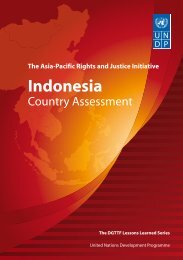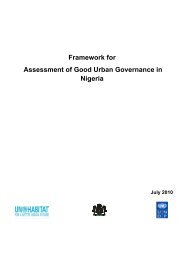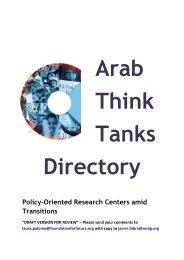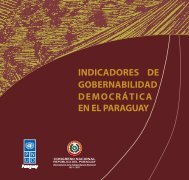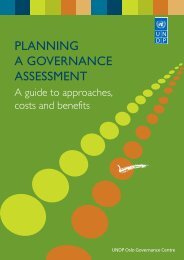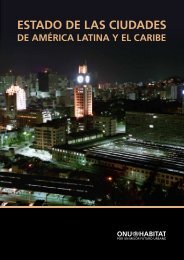A Users' Guide to Measuring Local Governance
A Users' Guide to Measuring Local Governance
A Users' Guide to Measuring Local Governance
Create successful ePaper yourself
Turn your PDF publications into a flip-book with our unique Google optimized e-Paper software.
11<br />
Council of Europe’s <strong>Guide</strong> <strong>to</strong> Developing Well-Being / Progress<br />
Indica<strong>to</strong>rs with Citizens – Application of the <strong>Governance</strong><br />
Module in Timisoara (Romania)<br />
Producer<br />
Council of Europe, Inter-réseau Européen des<br />
Initiatives Ethiques et Solidaires, Terri<strong>to</strong>ire<br />
Responsable: Groupe de Coordination Timisoara,<br />
European Commission.<br />
His<strong>to</strong>ry<br />
The Council of Europe published in 2005 a<br />
methodological guide entitled “Concerted<br />
development of social cohesion indica<strong>to</strong>rs”, which<br />
sets out the broad concepts and methods and<br />
proposes a database of possible indica<strong>to</strong>rs. In the<br />
wake of this publication, at the suggestion of the<br />
Congress of <strong>Local</strong> and Regional Authorities, various<br />
experiments in applying the principles set out in<br />
the guide were carried out at local level, in order <strong>to</strong><br />
construct indica<strong>to</strong>rs of progress / well-being with<br />
citizens. In these applications, eight dimensions of<br />
well-being were systematically reflected in the<br />
criteria put forward by citizens: Feelings (subjective<br />
well-being), Social balances, Relations between<br />
persons, Access <strong>to</strong> essential resources, Personal<br />
balance, Commitment/participation, Relations<br />
with institutions, Living environment.<br />
The Well-being Indica<strong>to</strong>rs have been used in<br />
Timisoara as an experimental application of the<br />
guide of the Council of Europe. Given the focus of<br />
this guide on decentralised governance, only the<br />
governance module of the indica<strong>to</strong>rs system<br />
developed in Timisoara will be considered.<br />
Objectives<br />
The well-being indica<strong>to</strong>rs aim <strong>to</strong> foster, among<br />
those concerned in a particular area or institution,<br />
shared responsibility for the well-being of all and<br />
ensure that the parties concerned actually take<br />
part in fulfilling this responsibility.<br />
Applicability<br />
The indica<strong>to</strong>rs are applicable <strong>to</strong> a variety of<br />
different local contexts, ranging from municipalities<br />
and districts (where citizens are involved in the<br />
assessment process <strong>to</strong> obtain data that are often<br />
not available from statistical departments) <strong>to</strong><br />
school establishments and private companies (<strong>to</strong><br />
analyse the impact of human activities on<br />
well-being.)<br />
Types and sources of data used<br />
Data (both subjective and objective information)<br />
are collected through statistical records, studies,<br />
activity reports, well-informed persons and<br />
citizens’ surveys.<br />
Methodology<br />
The Indica<strong>to</strong>rs were elaborated and measured<br />
through a five-stage process, involving about 250<br />
citizens. In the first stage, different citizens’<br />
categories were organised in small, homogeneous<br />
groups of eight <strong>to</strong> ten people. These groups were<br />
invited <strong>to</strong> consider well-being issues individually<br />
(by writing “post it” notes) and then collectively<br />
(taking s<strong>to</strong>ck of their thoughts <strong>to</strong>gether) in light of<br />
three simple and completely open questions:<br />
1) What do you understand as “well-being” in<br />
Timisoara?<br />
2) What you understand as “ill-being” in<br />
Timisoara?<br />
3) What do you do <strong>to</strong> ensure your own well-being<br />
in Timisoara?<br />
This generated almost 300 highly varied criteria for<br />
well-being. In the second phase, these criteria were<br />
pooled and organised according <strong>to</strong> the main facets<br />
of well-being, so as <strong>to</strong> produce a consolidated,<br />
inclusive set of 31 indica<strong>to</strong>rs organised along 7<br />
principal dimensions. The following table presents<br />
the indica<strong>to</strong>rs chosen for the dimension on<br />
governance.<br />
Each indica<strong>to</strong>r of progress/well-being can be<br />
evaluated on the basis of a 5-point scoring scale<br />
expressing the existent situation with respect <strong>to</strong><br />
each indica<strong>to</strong>r: from 0 = very bad situation <strong>to</strong> 5 =<br />
ideal situation. The following table provides an<br />
example of such a scoring scale for the governance<br />
indica<strong>to</strong>r “institutional relations with citizens.”<br />
A Users’ <strong>Guide</strong> <strong>to</strong> <strong>Measuring</strong> <strong>Local</strong> <strong>Governance</strong> 99




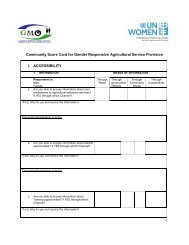
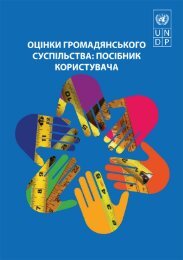
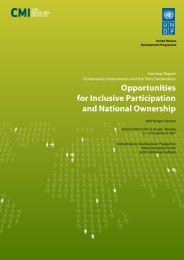
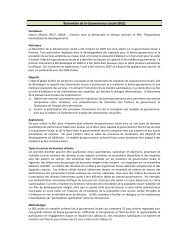
![GuÃa del Usuario ] - Governance Assessment Portal](https://img.yumpu.com/44740603/1/190x253/gua-a-del-usuario-governance-assessment-portal.jpg?quality=85)
